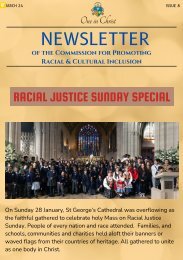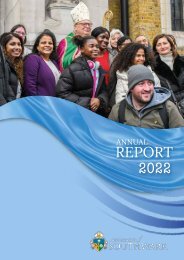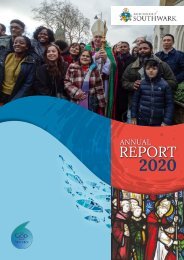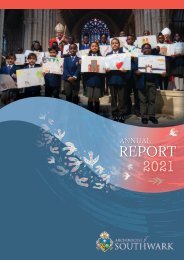Issue 50 - The Pilgrim - June 2016 - The newspaper of the Archdiocese of Southwark
The June 2016 issue of "The Pilgrim", the newspaper of the Archdiocese of Southwark
The June 2016 issue of "The Pilgrim", the newspaper of the Archdiocese of Southwark
Create successful ePaper yourself
Turn your PDF publications into a flip-book with our unique Google optimized e-Paper software.
<strong>The</strong> <strong>Pilgrim</strong> <strong>June</strong> <strong>2016</strong><br />
Europe and <strong>the</strong> common good<br />
Fr Ashley Beck, assistant priest at St Edmund <strong>of</strong><br />
Canterbury, Beckenham, and lecturer in pastoral ministry<br />
at St Mary’s University, Twickenham, continues his series<br />
exploring modern papal encyclicals<br />
On <strong>the</strong> feast <strong>of</strong> Pentecost, we<br />
celebrate <strong>the</strong> coming <strong>of</strong> <strong>the</strong> Holy<br />
Spirit on <strong>the</strong> disciples and, like<br />
<strong>the</strong> whole <strong>of</strong> <strong>the</strong> season <strong>of</strong> Eastertide,<br />
this leads us to reflect<br />
about, and to celebrate, <strong>the</strong> nature<br />
<strong>of</strong> <strong>the</strong> Catholic Church.<br />
<strong>The</strong> Holy Spirit dwells within<br />
<strong>the</strong> Church as a guarantee <strong>of</strong><br />
truth, <strong>of</strong> freedom from error.<br />
That is what we mean when we<br />
say that <strong>the</strong> Church is infallible in<br />
its teaching ministry. Much <strong>of</strong> this<br />
ministry is articulated in <strong>the</strong> ministry<br />
<strong>of</strong> <strong>the</strong> Vicar <strong>of</strong> Christ, which<br />
is why we talk <strong>of</strong> <strong>the</strong> pope being<br />
infallible.<br />
So Pentecost and <strong>the</strong> weeks<br />
following are a good time to<br />
think about <strong>the</strong> subject <strong>of</strong> my<br />
monthly articles this year, encyclical<br />
letters from <strong>the</strong> popes <strong>of</strong><br />
<strong>the</strong> last century.<br />
Pope St John XXIII, as many <strong>of</strong><br />
you will still remember, was only<br />
pope for five years, having been<br />
elected at a great age, and many<br />
saw him as a stop-gap or a “caretaker”<br />
pope: but in those years<br />
he achieved a tremendous<br />
amount, above all by calling <strong>the</strong><br />
Second Vatican Council, which<br />
opened only a few months before<br />
he died <strong>of</strong> cancer in <strong>June</strong> 1963.<br />
But two <strong>of</strong> his encyclical letters<br />
are also very important and we<br />
will look at <strong>the</strong> first this month,<br />
Mater et Magistra, issued in <strong>the</strong><br />
summer <strong>of</strong> 1961. <strong>The</strong> letter’s<br />
opening words are a good Pentecost<br />
statement: “Mo<strong>the</strong>r and<br />
teacher <strong>of</strong> all nations - such is<br />
<strong>the</strong> Catholic Church in <strong>the</strong> mind<br />
<strong>of</strong> her founder, Jesus Christ.”<br />
For us it might not seem a very<br />
striking description but it actually<br />
sets a tone in addressing <strong>the</strong><br />
“nations” which strikes <strong>the</strong><br />
reader as somewhat warmer and<br />
more ‘mo<strong>the</strong>rly’ than had been<br />
true in <strong>the</strong> recent past (<strong>the</strong> pope<br />
actually got <strong>the</strong> phrase “Mo<strong>the</strong>r<br />
and Teacher” from Innocent III in<br />
<strong>the</strong> Middle Ages).<br />
<strong>The</strong> letter celebrates <strong>the</strong> 70th<br />
Pope John XXIII meeting President<br />
Dwight D. Eisenhower in 1959<br />
anniversary <strong>of</strong> <strong>the</strong> letter <strong>of</strong> Leo<br />
XIII, which we looked at in March,<br />
Rerum Novarum, seen as <strong>the</strong> beginning<br />
<strong>of</strong> <strong>the</strong> modern tradition<br />
<strong>of</strong> Catholic Social teaching, and<br />
<strong>the</strong> pope addresses social issues<br />
in <strong>the</strong> light <strong>of</strong> Catholic moral<br />
teaching.<br />
As with all papal encyclicals,<br />
<strong>the</strong>re is a lot <strong>of</strong> emphasis on continuity.<br />
That is why <strong>the</strong> anniversaries<br />
<strong>of</strong> Rerum Novarum are<br />
seen as important. But at <strong>the</strong><br />
same time <strong>the</strong> tradition grows<br />
and develops as <strong>the</strong> Church responds<br />
to changes in <strong>the</strong> world,<br />
to history.<br />
<strong>The</strong> change in tone is crucial,<br />
reflecting Pope John’s overall approach<br />
<strong>of</strong> warmth and a desire<br />
for reconciliation, but <strong>the</strong>re are<br />
two big ways in which <strong>the</strong> letter<br />
shows a shift, a movement, in<br />
Catholic teaching.<br />
<strong>The</strong> letter is significant in<br />
many ways in <strong>the</strong> ra<strong>the</strong>r complicated<br />
world <strong>of</strong> Italian politics in<br />
<strong>the</strong> late 19<strong>50</strong>s and early 1960s<br />
which is too big a subject to be<br />
looked at here. But one thing <strong>the</strong><br />
pope does is to endorse moves<br />
towards what we call <strong>the</strong> “welfare<br />
state.”<br />
He welcomes what he calls “an<br />
increase in social relationships”<br />
and “a development in man’s social<br />
life”. Drawing on <strong>the</strong> writings<br />
<strong>of</strong> <strong>the</strong> Jesuit anthropologist and<br />
<strong>the</strong>ologian Pierre Teilhard de<br />
Chardin, <strong>the</strong> pope welcomes a<br />
sense <strong>of</strong> interdependence in <strong>the</strong><br />
human family. This means that<br />
when <strong>the</strong> state intervenes to help<br />
people it is a good thing “even in<br />
matter <strong>of</strong> such intimate concern<br />
to <strong>the</strong> individual as health and<br />
education, <strong>the</strong> choice <strong>of</strong> a career,<br />
and <strong>the</strong> care and rehabilitation <strong>of</strong><br />
<strong>the</strong> physically and mentally<br />
handicapped.”<br />
In <strong>the</strong> years immediately after<br />
<strong>the</strong> Second World War <strong>the</strong> Church<br />
in some places had seen welfare<br />
state policies as a sign <strong>of</strong> centralised<br />
state control and an undermining<br />
<strong>of</strong> <strong>the</strong> place <strong>of</strong> <strong>the</strong><br />
family (partly because <strong>of</strong> what<br />
had happened in Communist and<br />
Fascist countries).<br />
For most Catholics 15 years on<br />
this was less <strong>of</strong> a threat. <strong>The</strong><br />
pope’s endorsement is important<br />
all <strong>the</strong>se years later at a time<br />
when many <strong>of</strong> <strong>the</strong> services associated<br />
with <strong>the</strong> welfare state are<br />
no longer provided in <strong>the</strong> same<br />
way, if at all, a change generally<br />
criticised by Catholic bishops and<br />
charities.<br />
<strong>The</strong> second important development<br />
- and very topical in this<br />
month - is over international relations.<br />
Pius XII after <strong>the</strong> war had<br />
reminded Catholics that <strong>the</strong> sovereignty<br />
<strong>of</strong> nation states cannot<br />
be absolute. It is only relative<br />
and <strong>the</strong>re needs to be international<br />
bodies to stifle national<br />
aggression.<br />
Pope John takes this fur<strong>the</strong>r,<br />
specifically endorsing intergovernmental<br />
organisations: “<strong>The</strong><br />
demands <strong>of</strong> <strong>the</strong> common good on<br />
<strong>the</strong> international level include:<br />
<strong>the</strong> avoidance <strong>of</strong> all forms <strong>of</strong> unfair<br />
competition between <strong>the</strong><br />
economies <strong>of</strong> different countries;<br />
<strong>the</strong> fostering <strong>of</strong> mutual collaboration<br />
and good will; and effective<br />
co-operation in <strong>the</strong> development<br />
<strong>of</strong> economically less advanced<br />
communities.”<br />
Mater et Magistra was written<br />
three years after <strong>the</strong> signing <strong>of</strong><br />
<strong>the</strong> Treaty <strong>of</strong> Rome, which set up<br />
<strong>the</strong> Common Market, <strong>the</strong> EEC.<br />
Italy had been a founder member<br />
<strong>of</strong> <strong>the</strong> common European institutions<br />
set up from 19<strong>50</strong>, and Pope<br />
John’s words are an endorsement<br />
<strong>of</strong> <strong>the</strong> ideals and aims <strong>of</strong> <strong>the</strong> EEC,<br />
which has grown into <strong>the</strong> European<br />
Union.<br />
Of course Britain was not a<br />
member <strong>of</strong> <strong>the</strong> EEC in 1961. But<br />
it is hard to square <strong>the</strong> pope’s vision<br />
with <strong>the</strong> outlook <strong>of</strong> <strong>the</strong><br />
“Leave” campaign in <strong>the</strong> current<br />
EU Referendum debate in this<br />
country. His vision should help to<br />
guide as we pray about how to<br />
vote.<br />
By Fr Daniel O’Leary<br />
Into every life, <strong>the</strong> wise ones say,<br />
comes one shining moment. It is a<br />
moment <strong>of</strong> glory. <strong>The</strong> curtains part,<br />
<strong>the</strong> vision is granted, and something<br />
is changed forever.<br />
That single experience, in one<br />
way or ano<strong>the</strong>r, stays with us always<br />
and colours <strong>the</strong> whole <strong>of</strong> our lives. It<br />
is <strong>the</strong> timeless time when <strong>the</strong> veil is<br />
drawn from <strong>the</strong> mystery <strong>of</strong> our existence,<br />
when our essence is disclosed<br />
to us, when we discover – even if<br />
only fleetingly – who we really are.<br />
It is a highly personal moment <strong>of</strong><br />
truth.<br />
Your one bright and shining moment<br />
may have to do with naming<br />
what or who you really love; with<br />
revealing to you <strong>the</strong> job or relationship<br />
that is slowly destroying you; or<br />
with becoming aware that all your<br />
decisions and reactions spring from<br />
a deeply hidden anxiety, anger or<br />
fear.<br />
Or it might be that you need no<br />
longer be afraid because you are<br />
loved unconditionally by a God who<br />
delights in you; that, without a<br />
doubt, <strong>the</strong> universe and life itself<br />
are safe places for yourself, your<br />
children and all you love; that<br />
everything that has ever happened<br />
to you is not happen-chance but<br />
part <strong>of</strong> a carefully crafted love<br />
story.<br />
Feature/Column<br />
Have you experienced<br />
a shining moment?<br />
In <strong>the</strong> popular film<br />
‘It’s a Wonderful<br />
Life’, George Bailey<br />
experiences a<br />
shining moment<br />
<strong>The</strong> Leaven<br />
Carmelite Secular<br />
Institute<br />
CALLING ALL<br />
Single and widowed women<br />
Seeking to dedicate<br />
<strong>the</strong>ir life to God<br />
Through vows in secular society.<br />
Contact: <strong>The</strong> Secretary, <strong>The</strong> Leaven,<br />
c/o <strong>The</strong> Friars, Aylesford ME20 7BX.<br />
Tel: 01883 742488.<br />
Email: kinman@ouvip.com<br />
www.<strong>the</strong>leaven.org.uk<br />
It might be that your shining moment<br />
happens when God comes to<br />
you usually disguised as your life, in<br />
all its bits and pieces; that apart<br />
from one or two cherished beliefs,<br />
nothing matters very much. You realise<br />
that it is in our weakness and<br />
sinfulness that we are strongest <strong>of</strong><br />
all and that we are indestructible<br />
and untouchable as long as we remain<br />
close to God.<br />
<strong>The</strong> human life <strong>of</strong> Jesus in time<br />
and space was one <strong>of</strong> <strong>the</strong> brightest<br />
shining moments in <strong>the</strong> history <strong>of</strong><br />
creation. In <strong>the</strong> fullness and totality<br />
<strong>of</strong> his very own humanity lies <strong>the</strong> secret<br />
passage to <strong>the</strong> heart <strong>of</strong> God.<br />
And, <strong>the</strong>refore, likewise with us.<br />
It is during our most desperate, ecstatic,<br />
despairing, joyful, routine,<br />
hopeless times that those luminous<br />
moments <strong>of</strong> clarity surround us with<br />
transparency.<br />
We are held in a threshold between<br />
two phases <strong>of</strong> our lives – not<br />
to do with <strong>the</strong> chronological time <strong>of</strong><br />
years and decades but with <strong>the</strong><br />
kairos-time <strong>of</strong> falling into mystery,<br />
<strong>of</strong> falling in love with God.<br />
<strong>The</strong>se moments heal and transcend<br />
<strong>the</strong> damaging religious education<br />
<strong>of</strong> our childhood days and<br />
liberate us into <strong>the</strong> belief that we<br />
are all gods-in-<strong>the</strong> making, that<br />
even from our murkiest and most<br />
sinful encounters with evil, God can<br />
bring light.<br />
Page 9

















